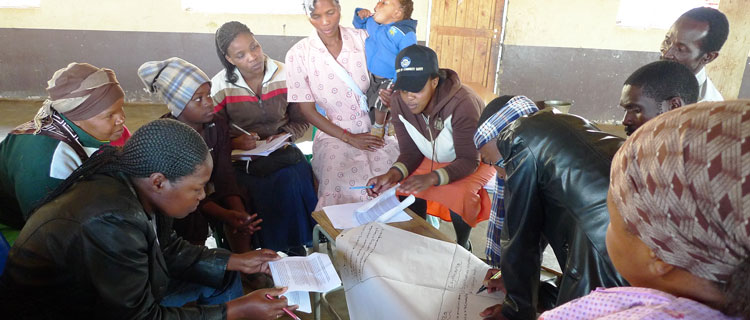
Scenario planning
There's a reason why they are called experts
Scenario planning yielding no different results than those of expert opinions
- New study focuses scenario planning among different actors, such as stakeholders and experts
- Experts and scenario stakeholders had similar results for an extended ecosystem service assessment, meaning participants do not need to be actively working in the area
- Study suggests that participatory scenario planning can be useful for learning about perception of an area
Who can you trust these days? Well, according to a study on the use of participatory scenario planning in ecosystem management experts with knowledge from the study area are still the go-to guys identifying and dealing with ecosystem services and uncertainties.
In a study recently published in Ecology and Society, centre researchers Rebecka Malinga and Line Gordon, together with colleagues from Stockholm university and University of KwaZulu-Natal in South Africa, have studied whether the use of scenario planning provides other insights in the selection of ecosystem services in changing landscapes.
Time consuming and potentially ineffective
Using an agricultural landscape in South Africa they compared different sets of ecosystem services selected by four different sources: stakeholders participating in scenario planning exercises, experts who were given access to the same scenarios, a third group of experts who had not read the scenarios but have in-depth knowledge of the study area, and a list of ecosystem services derived from literature.
The results showed that the list of ecosystem services selected by experts and the scenario stakeholders were overall the same, indicating that knowledge of a study area gained through the scenario exercise is not very different from that of experts working actively in the area.
"Scenario development takes a lot of resources, and carrying out scenario planning solely for the purpose of identifying ecosystem services might be cost ineffective"
Rebecka Malinga, co-author
The three scenarios
The main objective for the study was to develop a set of qualitative scenarios in the Upper Thukela region in KwaZulu-Natal, South Africa, where a future extended ecosystem services assessment is planned. The scenarios were developed as story lines of how the area would change until 2030. Three scenarios were developed.
In the first, called "Equal Environment", the national government was devoted to sustaining the natural resource base of the country and invest substantially in the rural countryside. For commercial farmers, however, the situation had become more difficult due to higher costs and taxes.
In the second scenario, "Diverging climate", the area had benefited from climate change, although many smallholder farmers struggled with low productivity due to few rural investments. In the third scenario, "Adaptive Collaboration", the Upper Thukela region had suffered from extreme weather events but the government were unable to cover the losses. However, strong bonds between local farmers and NGOs create a new way of dealing with the hardships and collaboration in agricultural production turned out successful for many smallholder farmers.
Based on these scenarios, lists of ecosystem services considered to be most important for the region were selected by the scenario participants and the experts in addition to a list extracted from a literature review.
Rebecka Malinga and her colleagues acknowledge that one reason why experts and scenario stakeholders responded in pretty much the same way was because the scenarios were too cautious to generate a large difference between ecosystem services today and in the future.
"The scenarios developed through this research were aimed to be plausible, but none of them deal with extreme change. This may have contributed to the fact that the lists developed by the scenario stakeholders and the experts were very similar," Malinga says.
Pushing in the right direction
Although the scenarios failed to produce other insights than what the experts did, Malinga and her colleagues highlight several advantages with participatory scenario planning. Above all, it can help a community to push its development in the right direction.
“First of all it proved to be a useful tool to learn about some of the major fears and expectations about the future among the people in the area. Developing alternative scenarios encourages project participants to think about factors that might alter the expected development path and to consider a number of interacting driving forces.”
“Through the scenario development process it is possible to establish a platform for discussion with local and regional stakeholders about the future of the region. This is very valuable for an ecosystem service project,” Malinga concludes.
Watch centre researcher Garry Peterson explain the concept of scenario planning:
CITATION
Malinga, R., L. J. Gordon, R. Lindborg, and G. Jewitt. 2013. Using participatory scenario planning to identify ecosystem services in changing landscapes. Ecology and Society 18(4): 10. http://dx.doi.org/10.5751/ES-05494-180410
Rebecka Malinga is a PhD-student who investigates multiple ecosystem services in South African agricultural landscapes, their spatial distribution and their interrelations.
Line Gordon focuses on interactions among freshwater resources, ecosystem services and food production, with a focus on how resilience thinking can enable better management of these resources. Her work ranges from the global to the local (mainly sub-Saharan Africa) scale.






